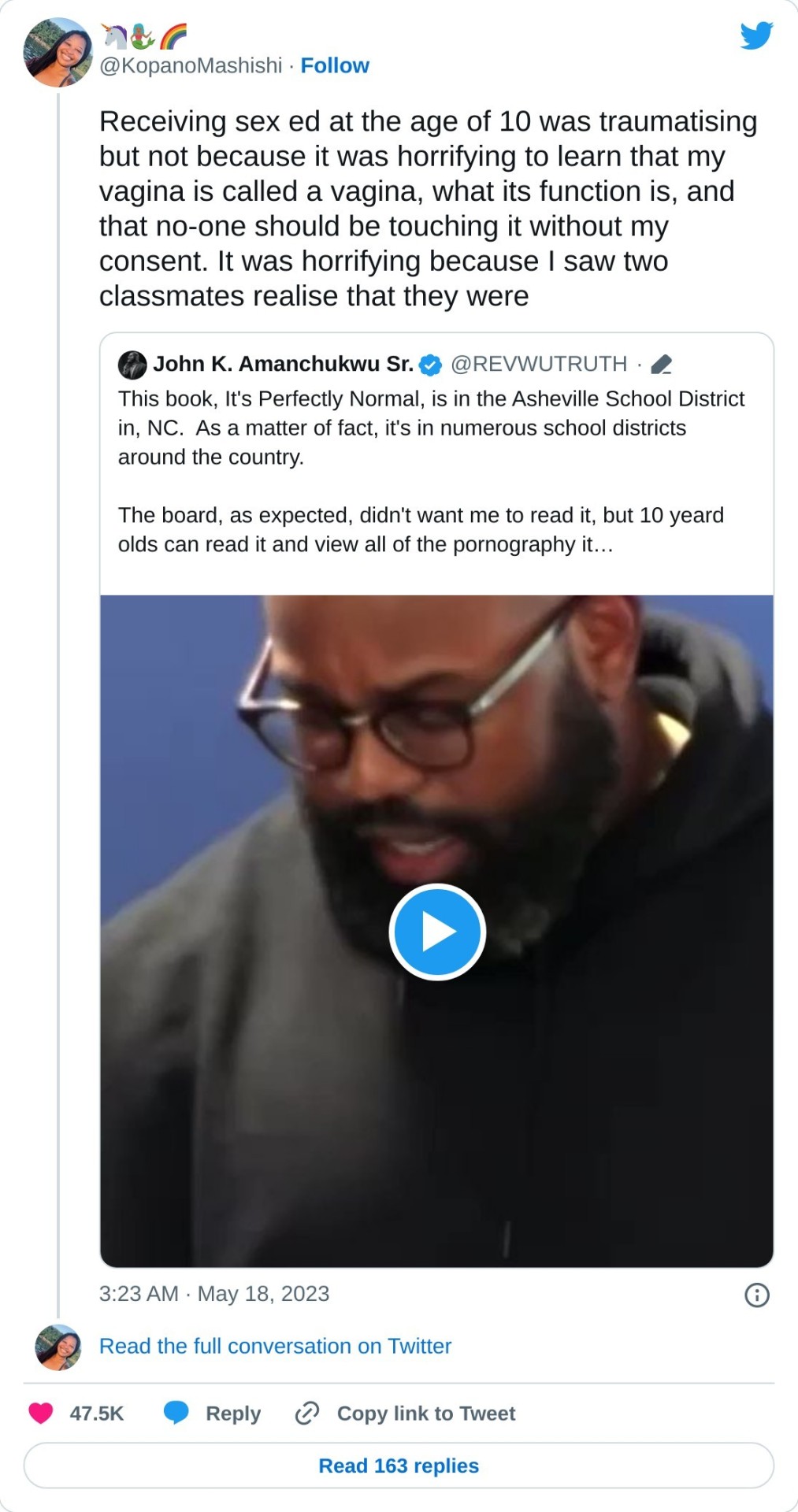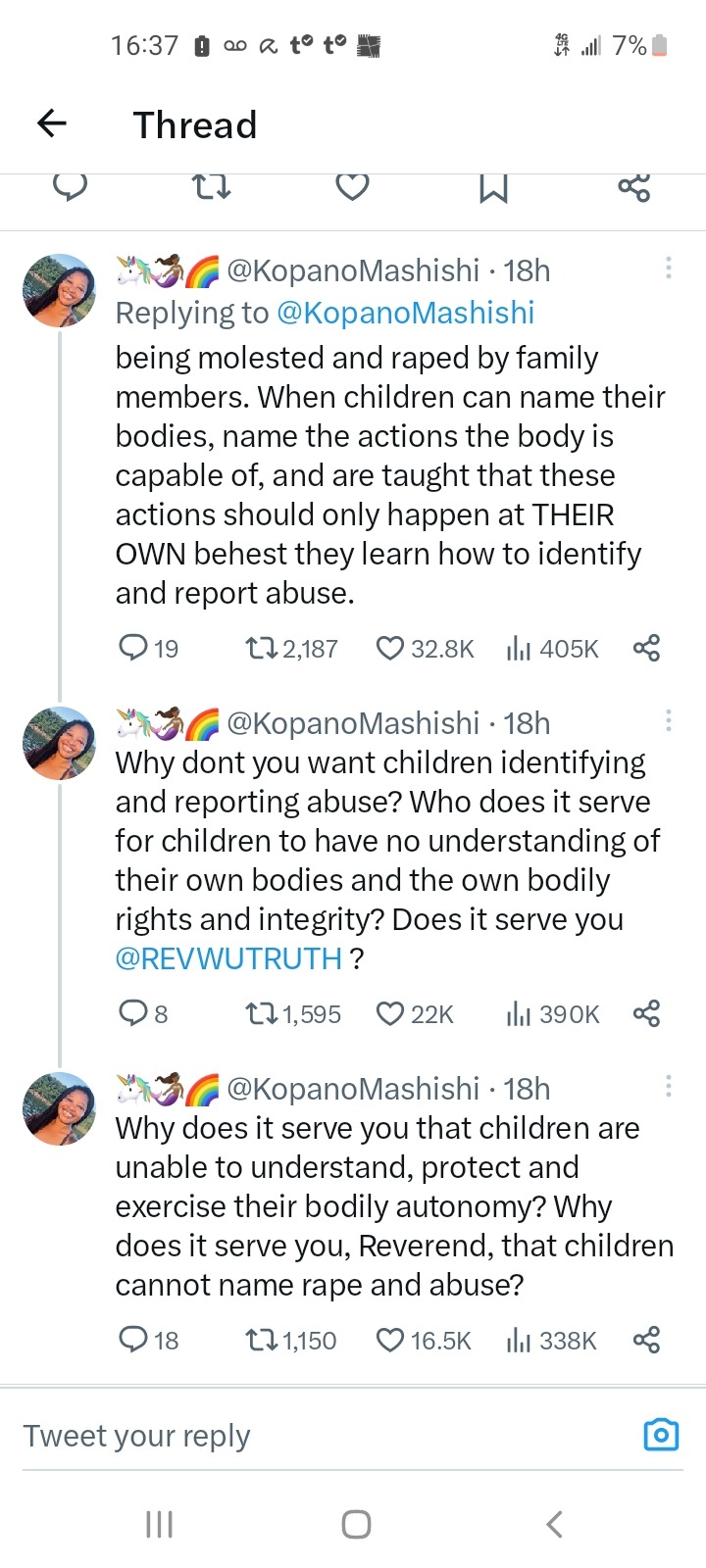#cw CSA mention
Text


26K notes
·
View notes
Text
saw these screenshots on reddit and I just.
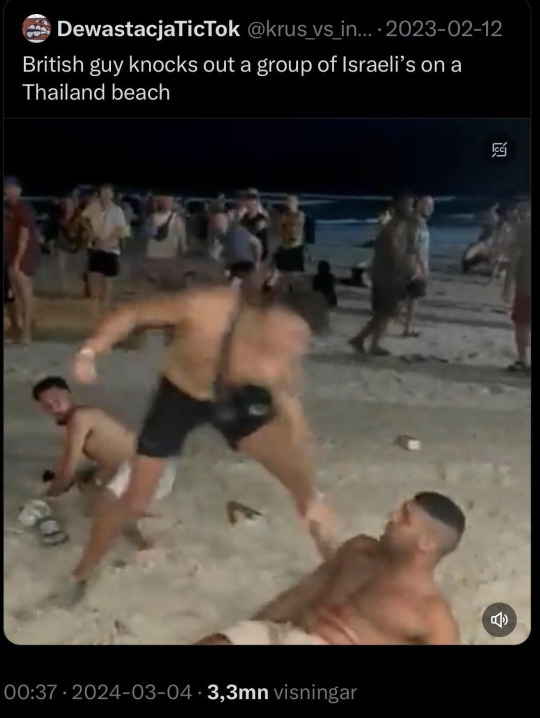




totally normal behaviour. no antisemitism or xenophobia here no sir.
#this is why i don't go on twitter#idk how to do the waterboard filter thing help#leftist antisemitism#antisemitism#cw csa mention#jumblr
323 notes
·
View notes
Text

Uh-huh. You realize, coming from a 26 year old, that this is just ageism, right? "I'll only take you seriously because of your age"... and you think you're in the right?
Yeah, "14 years olds act more 14 about it" because typically a group with absolutely zero societal power that is literally treated as the subhuman property of their parents and irrational mindless inconveniences that are only here to annoy "real people" will get upset when you continue to treat them as such while reminding them of the absolute privilege and societal power you hold over them.
I was 14 too. I remember the frustration at no one taking me seriously. I remember the fury that when I turned 18, 20, 25, suddenly everyone believed me about the things I'd been saying for 4, 6, 10+ years. I remember the disillusionment that happened when I realized the only thing that had changed was not some arbitrary debunked number at which the brain "develops fully", not some threshold of "maturity", but simply that I was no longer the age at which the state had a chokehold around my personhood, or in some cases the age which people think my human rights should have been delayed to.
Because it's not like adults EVER have bad opinions about something you say online, right? It's not like they don't FREQUENTLY respond to you trying to talk to them about it with stubborn and willful ignorance. It's not like the OP of this or a similar post didn't once respond to my detailed and logical essay about ageism with "lol I'm not reading all that". It's not like unreasonableness and angry nastiness at a post is utterly unlinked to the age of the person perpetrating it, and people of all ages do this in equal numbers.
Oh wait, it's exactly like that, it's just that society supports and even rewards the exact same misbehaviors in privileged people that they condemn in marginalized people.
It's just that when an adult does this, it's either that they're arbitrarily right based on their age/other privileged identity and often the marginalized status of the person arguing against them (see: OP, every argument on antisemitism where goyim are seen as the rational and reasonable and therefore right ones), the person arguing is being "immature" and "might be lying about being an adult' or "is acting like a child" (transmascs being silenced about their oppression using infantilization, the concern trolling of people who are happily 'crazy', the infantilization of disabled people and especially those who are intellectually, cognitively, or developmentally disabled), or both.
They're right. Their age has nothing to do with what they're saying. However, it has everything to do with how you're mistreating them. If they had no age in their bio, you might have taken them seriously, at least enough to believe they might listen to your viewpoint and to treat them like an equal human being.
If they had had an age above (usually 20-25), your last grasp at defense would have been to discredit them by comparing them to a 14 year old or accusing them of lying about their age, precisely because even adjacency to that identity allows you to shut down any argument they make.
Unfortunately, when you're in your 20s and 30s, everything is influenced by how fucking 20-40 you are. You forget exactly how cruel and oppressive society is to children. You forget how people magically started treating you like a person instead of a thing that existed only to "irrationally" be angry at the world around you. You forget how you were right to be angry at how they treated you.
You forget that you were legally allowed to have someone else dictate what and when you ate, how you dressed, whether you received necessary medical care, whether unnecessary medical procedures such as intersex "correctional" surgeries and treatment were forced on you at any age, when and for how long you were allowed to leave the house, and if they hit you in a well-known erogenous zone it would have been considered "discipline" as long as they called it "spanking" and not "physical and sexual abuse. You forget this and any number of other things considered abusive if a partner or roommate were to do it to even someone who had just turned 18 two seconds ago.
You forget that while it was technically illegal for your parents to starve you, to beat you, to emotionally abuse you by gaslighting or daily verbal abuse or manipulation, to torture you, to sexually abuse you, to hurt you to the point of you developing PTSD and or dissociative disorders, that there is very little recourse for actually enforcing it. You forget that you just have to hope that a different adult believes you, and in order for them to do that you usually have to fit a stereotype of a good victim and that your parents usually already have to be not in good standing with your community.
You forget how many cases of actual textbook abuse CPS does nothing about for "lack of proof" despite a supposed societal narrative of "believe victims".* You forget that they prioritize reunification even in cases of actual physical abuse, often with the abuser themself. You forget that you were a member of the only class that can have the police called on them like dogcatchers to drag them back kicking and screaming to their abusers, with no recourse or means of escape provided, because the state depends on and serves the institution of the "nuclear family". You forget that historically police served to return escaped property to their owners, and still do so today.
(*Believe victims if they have any measure of societal power that causes consequences for not believing them. Believe victims as long as you will be judged by most people for not believing them. Believe victims only if you can be held accountable for not doing so.)
As a disabled person and therefore a vulnerable adult, I had the unique position of being treated as a child until I escaped at age 23. It was all the same arguments - that it was "for my own good", that I was "incapable of making those decisions for myself" (or apparently, finding someone I did trust to make them for me, because I was "unreliable enough" I couldn't even do that), and so on.
This only made me realize that, despite the fact that none of that was true, it wouldn't be okay even if it was. It's not okay for disabled adults who DO need significantly more help caring for themselves than I do and who are profoundly cognitively or intellectually disabled to have their autonomy infringed on and their consent violated.
So why, then, is it okay to do to a child, regardless of their actual ability to take care of themselves or "make rational decisions"? Why is it okay to treat a child this way? Why is it okay to regard someone as fundamentally subhuman until an arbitrary cutoff?
Why is it okay to assume complete and total irrationality and unreasonableness on the part of an entire class of people just because as a subjugated and oppressed class they are still on rare occasion irrational or unreasonable? Isn't that bog-standard bigotry?
Why is it okay to justify their oppression by them being sometimes unable to fully stand on their own two feet, without help or community, under the weight of the oppressive system itself that serves to reinforce that? Why claim the purposeful elimination of tools and obscuration of helpful skills and knowledge under the guise of "protecting them" shows that they are incapable of surviving without those violences in a system that you claim is not, in fact, openly hostile to them?
And yes, this does all matter in the context of petty online discourse, because it is these systems that serve to reinforce and be reinforced by this casual ageism.
It is reaffirming the ideas which uphold these systems - that children are incapable of being rational people with reasonable emotional responses to mistreatment, who have to be told at every point what is in fact fair and how they must react to not face active bigotry for their immutable identity. It is conditioning children to beg for scraps of respect so that they learn assimilation early and go on to perpetuate childism when they themselves become adults.
It's petty and cruel, and it's destroying my faith in humanity to see marginalized people I otherwise respect sharing this. Y'all of all people should know better. Y'all of all people should be able to see how it maps to multiple of the various types of oppression and even intersectional oppression and then goes further.
Y'all of all people should be able to remember how being a child was your primary identity and primary form of marginalization, because you could legally be allowed to be abused for your other marginalized identities and most people in fact supported your family doing so, or at least felt that even if it was wrong it was still "their right" to do so.
Maybe you were privileged enough to have a supportive family, but I know for a FACT most of you weren't.
Kids are considered uniquely incapable of having any identity that is not immediately apparent - of knowing they are chronically ill or queer or plural or neurodivergent. They are considered incapable of having valuable and complex thoughts about politics or religion. They are not listened to or considered experts on the specific intersectional discrimination they face for immediately apparent identities, such as being children of color or visibly disabled. Adults within those groups are considered the experts on forms of discrimination they'll even admit they no longer experience, but that children continue to.
This is not just queerphobia or ableism or racism or any other number of forms of bigotry. This is specifically childism intersecting those forms of bigotry. It is not just not okay because of their queer or disabled or racial or other identity. It is not okay because children are fucking people, and yeah, deserve to be treated as equals and not be condescended to even in the actual rare cases where their reasoning is not completely rationally sound - just as is the case for disabled people, I might add.
If you can see how one is ableism but not how the other is bigoted childism, if you can't see the parallels between two cases where
-most individuals in a class are fully rational and intellectually capable people purposely being mislabeled as not so in order to justify their subjugation
-which is fundamentally reliant on the societal acceptance of mistreatment of those who may not be fully rational or intellectually capable (which is deeply ableist/childist, oppressive, and wrong),
-and where those who actually aren't fully rational or are intellectually incapable face no reprieve both in being weaponized against members of their own class with relative privilege AND in fighting their own mistreatment, which unlike in the case of those who might be able to convince others of their capability is considered always justified on the basis of their incapability, while not actually being okay on ANY basis,
then I can't help you.
To be clear, the reason it is ableist and/or childist to label someone as intellectually incapable when they are not is not at all because actually being so would be in any way bad. It's because it relies on the deep, insidious ableism/childism against those who are considered intellectually capable to function. It is essentially a separate facet of that same ableism/childism, and one specifically functions because of the other facet of ableism/childism that says that all members of said class are incapable and therefore need to be mistreated in the same way as those who actually are.
"No one deserves to be treated this way," is fundamentally how this oppression should be addressed, period. Understanding how it functions differently for different people, and how easily the most vulnerable members of an oppressed class could have their liberation tossed aside in order to pursue assimilation for the less vulnerable is still important, though. Understanding that your own oppression relies on the total subjugation of part of your community on the basis of an ontological trait that they have and you do not is actually paramount in recognizing both your own relative privilege and how to effectively fight the oppression you all face.
Or to put it simply, it's important to recognize that if you're being oppressed because someone is claiming you're something you're not, that that oppression isn't okay toward the people who are that thing.
Anyway, adults who talk about childism, adultism (I apologize that I struggle to remember the difference between the two, much like I struggle with the difference between ableism and disableism), and youth liberation also hold privilege. As I mentioned above, the most that someone can use to discredit me here is to say that I'm immature or they think I'm secretly a child.
Even the people who really don't want to examine their own privilege and complicity in their hierarchical relationship with children are more likely to listen to me, and if they don't they'll make fools of themselves with such lines as "I refuse to read anything longer than a twitter post to educate myself on complex systems of oppression".
I'll keep trying to stand up for children anyway. Not just because I actually remember what it's like to be 14, but because I have a responsibility to do so as an adult. I'll uplift the voices of the children who quite honestly are way better at explaining this and have a far better understanding of both the direct experience and the sociological theory behind it than I ever will be.
Also note: I didn't anywhere in this post point out how people who are 17 and some months are functionally indistinguishable from those who have just turned 18, or how variations in "development" might cause some who are 15 or 16 to be very similar to others who are 18, or so on.
Quite frankly, I don't think that matters. I do think 14 year olds deserve to be treated with respect just as much as 17.99 year olds, and I also think often 17.99 year olds face much of the exact same mistreatment and oppression (especially systemically) as 14 year olds. The exceptions where legal emancipation can help those over 16 are both rare enough and require trading being controlled for being unsupported. Therefore I think that while a more nuanced conversation about this could take place within the communities actually affected by this, I think it's neither appropriate nor helpful here.
I'd also like to remind people that predators are often successful at grooming children because they pretend to treat them with respect and take them seriously. The answer to this should not be "oh, anyone who respects children is a groomer", but rather, "hey, maybe if everyone treated children with respect and took them seriously, actual predators would have one less avenue through which to target and harm children".
As a CSA victim myself, I will NEVER stop doing anything and everything I can to prevent more children from becoming victims. I only care about what's effective, not what feels good in pseudo-proxy revenge fantasies against imagined perpetrators while very real ones continue to go unnoticed and unchallenged by society.
I take children seriously because it's the right thing to do, but also specifically to fight CSA. I also remind anyone who needs it that they do NOT know they can trust me or anyone else on that sole basis. While I want to be a safe adult, doing so in a society where children have no recourse against mistreatment fundamentally requires them protecting themselves by not trusting me just because I recognize the power I have over them and the ways in which they are abused.
(This is another example of how the fearmongering mindset over generational friendships, particularly between minors and adults, is just as harmful as the pushback against comprehensive sex education and coming from the same puritan and christofascist roots. Knowing that something is sexual abuse just allows victims to voice what they're experiencing. Having safe adults who respect them allows children to recognize the manipulative behaviors and other red flags of unsafe adults.)
Anyway, all the original post is saying is "I don't like when members of an oppressed class stubbornly refuse to compromise on being treated as equal people with valuable thoughts and rational responses to mistreatment, and in fact insist on being listened to when I say things that are cruel, unfair, and untrue."
(When did use of "unfair" become a synonym for "whiny snowflakes children who just can't see that life is inherently unfair" in leftist spaces that purportedly fight against systemic injustice, anyway? When did it become something "immature" in the fight against identity-based violence that is inherently not fair?)
So I guess, act more 14 about it. I'll continue acting more disabled and queer about ableism and queermisia, so I fail to see what's bad about that. But imagine thinking that interacting with someone on the basis of their age is useless and thinking you're in the right for it. Truly showing their entire ass.
#childism#adultism#youth liberation#cw csa mention#csa mention#it's sometimes shocking to me that people are so much more ignorant about child liberation than even like. mad liberation and stuff#but it makes sense bc children are fundamentally THE most oppressed class on the planet#also yes I'm using USamerican ages here bc that is what I have perspective on#I welcome people from countries where personhood is granted at different ages to weigh in#also I use children here but I'm not sure if I should say 'minors' or something else instead esp when primarily discussing teens so like#lmk if I need to change that#undescribed#needs ID
84 notes
·
View notes
Text
All right, I lied I’m talking about it again
CW for mentions of sexual assault, CSA, supposed, pedophilia, fandom, discourse, kink, etc, etc
First, let me explain to those confused, what happened and then I’ll defend myself and then we’ll leave it there because once I go through everything your opinion is just going to be based on your point of view and I can’t really argue you out of that which is fine, so just go ahead and block me if you think I’m a creep weirdo or anything else that Radiohead says
Today as I am in class packing up my shit to leave right after my presentation I get a notification from a Tumblr mutual that said that a Tumblr blog I’ve never heard of or interacted with is posting about me in a harassing way so I go and I check it into my surprisethey posted screenshots of my most recent fanfiction. I miss you Mr. Miller.
The post explicitly called me a pedophile. I’ll share the screenshots, but the username as far as I can tell has been cropped out of everything. If you want to send and ask to this person and say your peace, I can’t stop you, but I ask you not harass this person, and simply report the post, if you know who it is
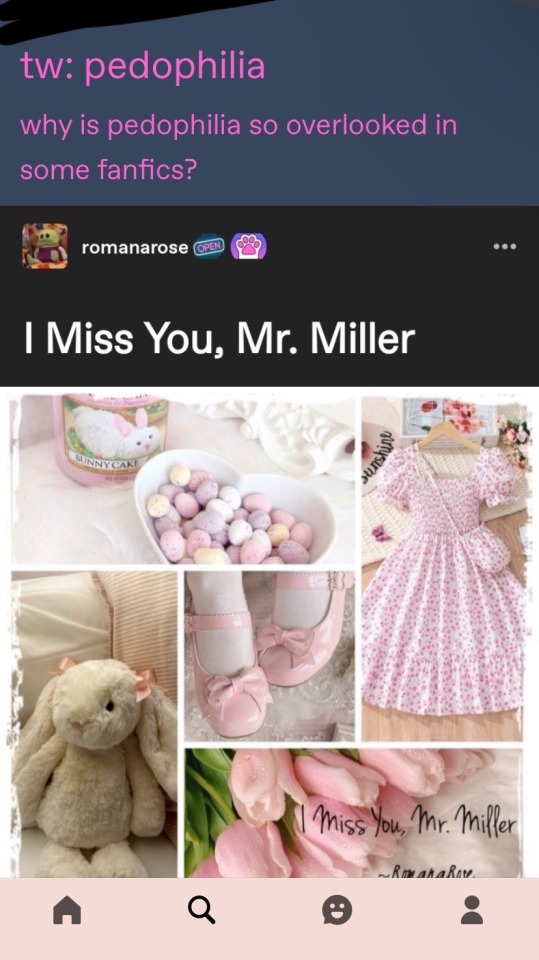
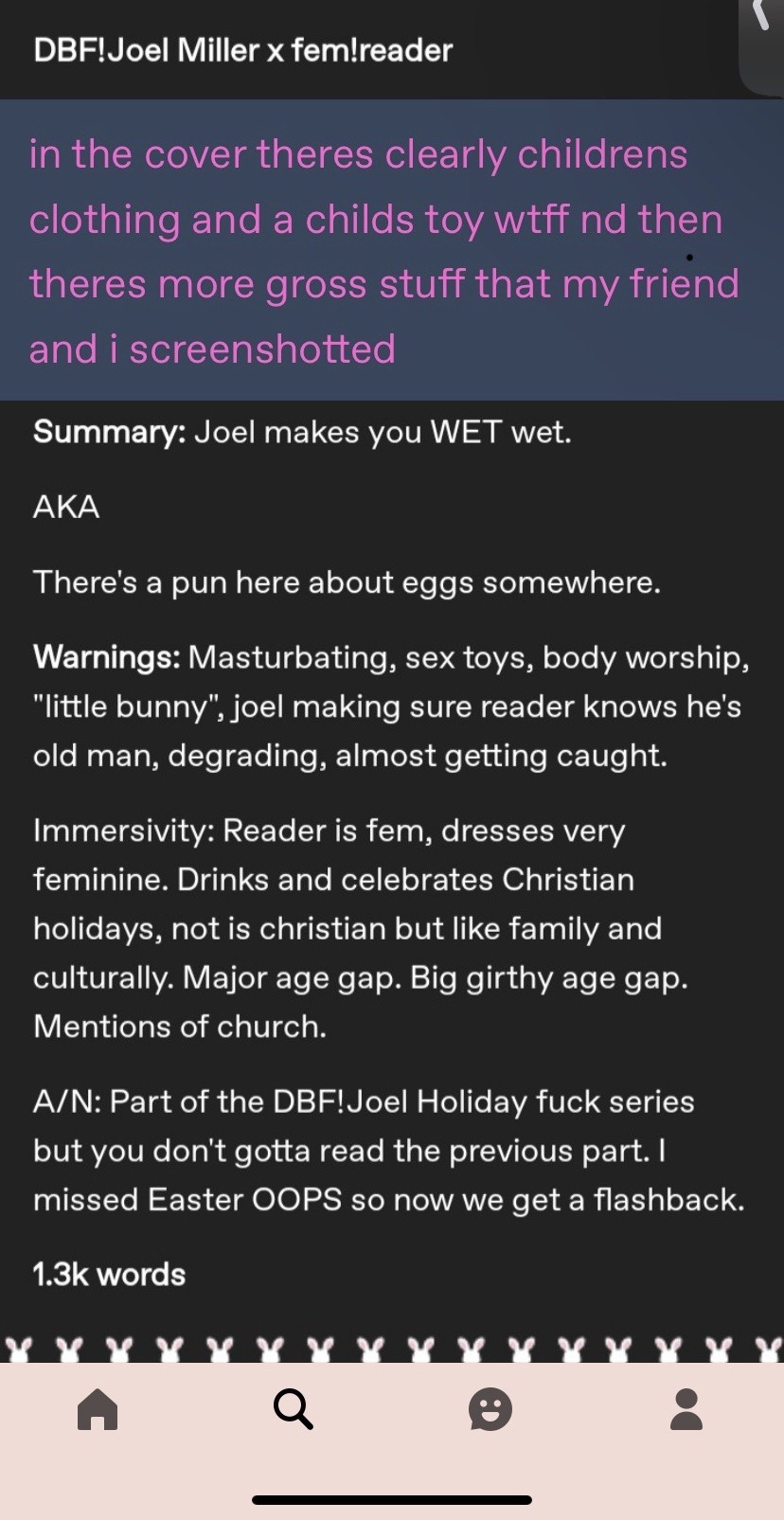


In one of the re-blogs or an answer to an ask, they called for mass, reporting my blog
No, I don’t say this to say that people who have been through what I’ve been through can’t be pedophiles or abusers, because they absolutely can but I say this to say why I had such a reaction to this and why I write the things I write
I have been a victim of child, sexual abuse was stocked, threatened and sexually harassed by an older man. When I was 17, lost my virginity to rape and 18, and then was raped again at 19 so believe me when I say that throwing around these words is shocking to me to just call me a pedophile. I write the things I write, innocent, reader, virgin reader, daddy kink, because of the things that I have been through sometimes as a reclamation of the experiences that I have suffered, sometimes as coping sometimes as comfort depends on the story.
No, let’s talk the specific issues
1. Shoes. Before I saw any of this, someone had DM me politely mentioning the shoes saying that they looked like child feet and that they wanted to make sure they were adult feet. I responded back that when I found the shoes on Pinterest they didn’t say anything one way or another, but I specifically look at the descriptions of clothing items because I don’t want to use clothing items that aren’t made for adults. If I can help it however, reverse image search shows that those are in fact an adult size and an adult model.

2. The dress once again, when I found the dress on Pinterest, I had already sorted out several dresses that I liked that first glance, but when I look at the description they said, teen or tween. It’s hard to tell right away it was certain styles there’s no model the dress is meant for what age I remember in my young adult hood when I was still dressing feminine and was a much smaller size. I sometimes found clothes at thrift stores. I thought were cute and would later find out they were meant for teens or twins, such as life.
2 Readers. Reader is 21+. Me personally I don’t put reader is 18+ in all my stories or my age gap stories, nor do I expect to see them when I read age gap stories in other peoples works, because I just assume everyone is an adult unless there’s some thing that tips me off against that, however, straight off the bat, the idea of being fucked in your childhood bedroomI feel like implies that she is one no longer a child and two doesn’t live there anymore. A couple chapters in, her and Joel are at her apartment and she was buying a new mattress having an apartment in itself implies at least 18 buying a new mattress is something you do in your 20s lol because no one was still in their name is gonna get excited about a mattress sale on Presidents’ Day. Then she was out drinking with Joel in a bar and yes, minors can get snuck into bars all the time I was a minor snuck into bars, however in this particular context, it just doesn’t make sense because Joel reader were already afraid of being seen together together. Joel wouldn’t want to add buying drinks for someone under 18 and taking them home after the bar to the list of worries and I know that in a lot of countries, the age of drinking can vary but in the US we’re both I live and where Joel fictionally lives the drinking age of 21, hence 21+ no none of the stuff I mentioned guarantees and reader but to me it’s coding in the same way that the people making accusations towards me are saying that reader is “coded“ as a child
3. Sex in the church. This was an afterthought in the person‘s post but I’ll address it anyway because they’re losing their mind that I mentioned having sex in a church for the context of the thick. Specifically, they had sex in a church bathroom, not in the actual sanctuary, or the pews, or anything however, for the record, I don’t got a problem with fanfiction having sex in a church because it’s not real. I would never actually have sex in a church, I try to go up to avoid going to a church as much as possible. The fanfiction isn’t real, it can’t hurt you
Lesson fucking learned, explicitly say reader is 18+ every time or someone is gonna accuse you of being a pedo
In the end, it’s not gonna change anyone’s minds. Because if you think that calling someone daddy, being hyper or liking to be babied, anything like that, makes you a pedophile, then I can’t really ration my way out of this.
However, I want to say thank you to everyone who reached out. A lot of blogs I’ve never interacted with a lot of friends, mutuals and on or blogs that I’ve followed on here for a year. Now I’ve reached out to me and offer their support which I really really appreciate and I cannot appreciate enough.
Hopefully I can still enjoy my cousins wedding this weekend and get my schoolwork done that I need to before going back to classes on Monday and that this doesn’t make more worse my already precarious mental health. But I’ve gotten so much love in so many kind words that it’s hard not to feel grateful for the amount of support I’ve gotten.
Between this and a minor hoopla about my pride even, I’m kinda sick of tumblr sometimes but y’all remind me of the good
Yes, you can re-blog, and if you wanna know who it is then ask someone else that’s fine I don’t really care that much. I just don’t want to be dog piling the person.
However, please report it. Because people are still sharing it, and commenting and liking especially about the shoe size
That’s it that’s my peace

36 notes
·
View notes
Text
AI art is not a matter of "opinions" btw it doesn't matter at the end of the day what we as individuals think about AI art. We could all shake hands and believe AI art is real art and beautiful and etc etc tomorrow but it wouldn't stop AI from helping companies profit off of years of unpaid labour, destroy the art industry as a whole and spawn a ludicrous amount of child porn based on photos of random ass kids.
25 notes
·
View notes
Note
am i still ace if its a trauma response from years of childhood sexual abuse??
If you feel like the ace label fits you or feels comfortable or helpful at all, then you can use it, regardless of the reason.
49 notes
·
View notes
Text
you ever get something explained to you by your therapist and just have the almost primal urge to scream? like, this completely benign thing i do is actually a result of sexual abuse i endured at an early age? wow, thanks! thank you so much! i love life! wow! haha.
30 notes
·
View notes
Text
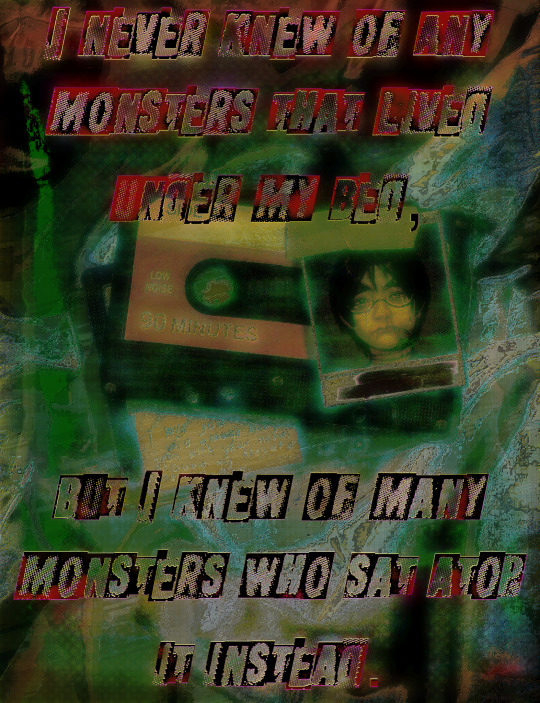
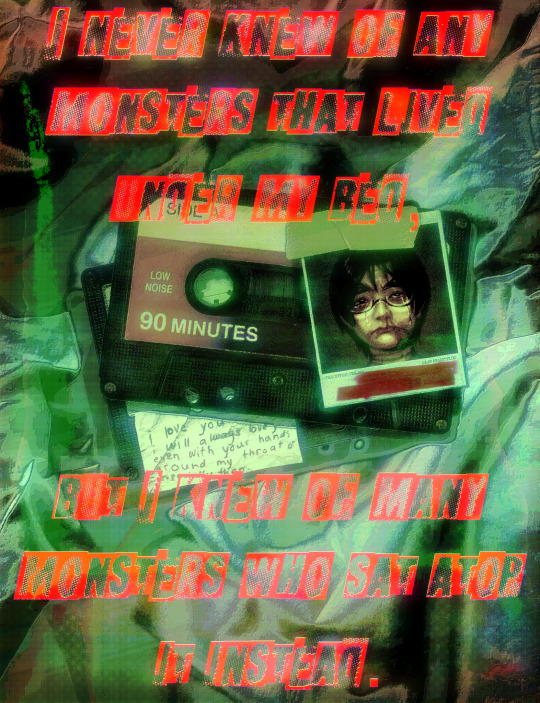
A rather heavy experimental piece. Could count as oc content and as something applicable to a real life issue igs. I hope I took all the right precautions on the tags 🙏
#tw csa#tw csem#tw csa implied#tw childhood trauma#tw child abuse#cw csa#cw csa mention#I hope I put enough tags#carboncopycomic
21 notes
·
View notes
Note
im also anti proship but calling rugrats porn drawings "child porn" really dilutes the severity of actual child porn. we shouldnt be confusing actual cp that hurts real children with just weirdos drawing porn of cartoon characters that happen to be kids, the two things are not at all on the same level
ok i suppose this was inevitable, i may as well get into it.
(CW for some discussion of CSA and child pornography, obviously)
first off, "i'm also anti proship but" is a terrifying way to start your message, and to go and follow it up with some extremely common proship copypasta i've heard a million times about "taking attention/resources/severity/etc away from real CSA victims" or whatever kinda makes me wonder how "anti proship" you actually are...?
kind of the point of this whole debate is typically that "proship" folks insist that fiction, or in this case "porn of cartoon characters that happen to be kids" as you put it, has no effect on reality or people's mindsets. and so-called "antis" like myself generally respond to this idea with something along the lines of "well it sure seems to affect the reality of your cock and balls", and point out how repeatedly consuming media with a particular focus or message has been shown time and time again to quantifiably influence the way people view the world around them, in ways that subsequently affect how they act, or desensitize them to things that might otherwise upset/offend them. y'know, like political propaganda! or blockbuster movies about killer sharks! obviously some people are going to be more resilient against that sort of influence when the real-world equivalent of "porn of cartoon characters that happen to be kids" is something so blatantly unacceptable, and nobody is really claiming that the impact of fictional CP is "on the same level" as its IRL counterpart.
but at the very least, most people who would be considered "anti proship" WILL tell you "hey, i'm not trying to say that you jerking it to twitter porn of Gwen Tennyson or Tails or whatever is LITERALLY THE SAME as committing CSA, but it's still really fucking concerning and creepy that the majority of your sexual fixations are all specifically cutesy vulnerable cartoon characters under the age of 12, many of whom also have canonical adult designs that you conveniently avoid in favor of sexualizing the ones that are barely old enough to learn long division. you should maybe do some introspection and figure out why that is and whether or not you're really comfortable with what it implies about you. personally i know I'M not comfortable with that shit and i'm not going to keep hanging around you unless you make some serious changes." except usually in my experience the conversation ends up being a lot shorter and ends in a block pretty quickly. like i'm not a psychologist and i don't keep a bunch of studies on hand to throw at you about how fictional CP is often a factor in grooming, but i DO have a brain and can pretty clearly see when someone is rationalizing behavior that will lead them to places i'm not willing to follow.
ANYWAYS to focus more specifically on the actual reason we're talking about this (which was, to be clear, a mobile ad Tumblr served me that depicted one of the dads from Rugrats having sex with his 3yo daughter): yes, actually, that shit IS illegal to create or distribute. it's not the SAME as literal photographs of real children, OBVIOUSLY, but it's still also extremely fucked up in its own right, and any reasonable person in your life would probably stop talking to you if you told them you got off to it.
don't believe me about the legality part? check this out:

so like, I GUESS you might get some legal leeway with cub furry art or sonic porn or stuff that isn't always obvious in how much it's intended to parallel real children? if you really care? but this ad was literally multiple illustrations of a human adult man having intercourse with a human toddler. it's pornography centered around openly fetishizing the sexual assault of a child by a parent. i fail to see how referring to that in shorthand as "child porn" is inaccurate in any way that matters.
and Tumblr is a US-based company, beholden to the laws shown above, so they are at least somewhat responsible when illustrated pedophilic incest porn gets shown to thousands of their mobile app users in an ad they got paid to display. THAT was the original point i was making in my post. but thank you for trying to derail it to interrogate my "anti proship" views or whatever, i have had multiple people send me fairly nasty asks about it in the past year and you finally caught me in a moment when i was already pissed enough about something else that i felt like going off about this stuff. sorry if you actually agreed with most of this and i came off as overly rude/harsh, but if that's the case then this response is for all the other anon asks and replies i've gotten too, i guess.
now we're all clear about where i stand and i hopefully don't need to talk about this again - it's kind of a fucking bummer to think about this stuff and i've been avoiding the subject intentionally. you are always welcome to just block me if you have a problem
33 notes
·
View notes
Text
I'm reading Kaze To Ki No Uta and there's no way in hell Alois Trancy wasn't inspired by Gilbert Cocteau.


Both are 14 year old boys from the 1880s who's hypersexual and violent behavior stems from their CSA trauma at the hands of their father (or in Alois' case, "father")
106 notes
·
View notes
Note
Just wondering, when you write SA/grooming in your stories (either your Owl House headcanons or your own stories like in Lupus Automata or The Olden Town), what is the motive of the abuser typically? Is it because they actually want to do those acts and these are efforts leading up to it, or is it typically to gain control of the victim to more easily manipulate them by using them at their most vulnerable? Or does it vary?
answering under the cut, cw for. WELL. You can guess
it depends on the abuser when it comes to what they want where we’re talking about specific characters, but the overall motivation across the board for every instance of sexual abuse irl and fictional is that it’s about control and power. Pleasure is a side effect and not the goal for abusers, much like how consensual sex is about love and rape is about doing harm. I don’t wanna get too into it too much but here’s some brief thoughts on your specific questions:
Belos didn’t see any of the Grimwalkers as people and used them as playthings and pawns for his own benefit so he could have control. Over them, over “Caleb,” over the isles, etc. Just the right amount of “affection” to keep them under his thumb and cement in their minds that nothing was theirs.
For Lumata- Kay el was a child in a dangerous environment that got preyed on by various denizens and visitors of Gorven because he was small and easy to manipulate and trick and didn’t have a parent or an adult he trusted or anyone to protect him. Again, control, power, selfish need. Shitty circumstance a la Denji, faces he can’t remember, which can be incredibly hard for someone struggling to accept that they were in fact abused. (I’d say his experience was more similar to being. trafficked rather than a single isolated abuser?) but NOTE that for his story specifically he didn’t just experience. that type of abuse. It was more common for him to be told to sneak into a tight location to steal something for someone or be a drug mule or get beaten up by some jerk alien or peacekeeper (space cop essentially) who got mad at him for whatever reason, but abuse is abuse.
Olden town is a little different because the experience with Alois and Izazel is almost cocsa but not quite? with an older teen/young adult taking advantage of a younger teen. Alois is not a good person. Yes he was part of a bad regime and his actions were also motivated partly by a need to please, but he had multiple chances to redeem himself or turn away or change and didn’t. He would say he “loved” Izazel if you asked, but he was incredibly controlling and didn’t want Izazel to have any agency. He wanted control.
36 notes
·
View notes
Text
An uncharitable reading on a population of largely traumatized neurodivergent kids that I found, that I responded to assuming OP was acting in good faith to try and open a conversation on the subject:
(Plaintext: An uncharitable reading on a population of largely traumatized neurodivergent kids that I found, that I responded to assuming OP was acting in good faith to try and open a conversation on the subject:)
to be honest i generally dislike the term "gifted kid". when people talk about being an "ex gifted kid" it's usually just to talk about burnout, which isn't anywhere near unique specifically to children who were part of some local gifted and talented program. when people talk about not learning the skills they need as an adult, that isn't unique to being "gifted" as a child. this happens to most people.
i think what is actually happening is that, as a child being treated better than their peers, their self worth was determined on academic success and being seen as smart and clever. but people develop at different rates and have different skills and the sort of abilities, skills, or intelligence you need to use isn't consistent throughout your academic year. so they "fall behind" when actually they're just average and not particularly worse than most other people. what they didn't learn was how to not hinge their self worth on academics and being better than other people. and how to see everyone as equal regardless of academic ability. people get caught up in the idea of only being "good" if they can be better than others and get top results with less efforts. which is really insulting to other people's efforts. this isn't getting over being labelled "gifted" and moving on with your life. it's clinging to that label that has long expired, and using it as a reason for why you are not as good as you would like to be.
and it shouldn't be insulting to say so if you've truly let go of the idea that people who are good at academics are better. that being smart and talented makes someone better. i really wonder how you think people who were bad at academics growing up feel about people saying that they should still be better than them, because they were better as children, and being on the same level is the worst thing ever. the moralising of intelligence and grades is so deep rooted you need to really dig in to get it out
My reply
(Plaintext: my reply)
The thing is, this is not how we use it at all.
continued below the readmore, please make note of the content warning/trigger warning tags on the post. we added both cw and tw tags to hopefully have as many people's filters be able to catch it as possible
The label "gifted kid" itself we view as a form of violence forced on kids.
It's not being told you're only "good" if you're "better than others". It's being told your sole, entire worth is wrapped up in your personal academic performance. It doesn't matter how other kids do, because they're "smart in their own ways" and "even if they're not smart, they're good at other things". It's still violently ableist against severely disabled kids, don't get me wrong; the message needs to be that all people inherently have worth, not that everyone is good at something.
But it's not about anyone else's performance, really. It's about yours, and only yours. I remember telling my parents "but [friend] gets Cs" and their response was "[friend] isn't you". Other kids were allowed to not get perfect grades in school, but if I didn't, I wasn't just not good enough, I was no longer a person.
This didn't just lead to "being average". This led to being severely, likely permanently, cognitively disabled. The burnout and trauma associated with it has made me incapable of doing many of the things that even the average adult can do. While the extent varies, especially after several years in recovery, for multiple years I couldn't do elementary level tasks. I've wondered for a while now if it caused actual brain damage (not due to traumatic injury, but that's not the only thing that can cause brain damage).
I still struggle with extreme executive dysfunction, worsened by the severe burnout and subsequent breakdown I endured - not just to the point where I struggle to fill out disability paperwork and make appointments, but even to the point where I need a caregiver in order to do things like make food and so laundry, and to the point where I sometimes have to wear diapers because task inertia and executive dysfunction make me unable to move to get to the toilet.
(This is worsened by physical disability, but if I'm being quite honest, the primary ways the two intersect is that pain further worsens executive dysfunction as well as ironically my lack of awareness of my bodily needs - forgot the term for that specifically; as well as increases frequency and urgency of bathroom needs and both cognitive and physical effects of missing meals.)
It's not and was never about "other people's efforts".
It's also hard to understate the severe negative impact of being taught to hinge your entire self-worth on something you become no longer capable of doing. This is the precise type of withholding conditional love and support in early childhood development that can later cause cluster B personality disorders. It's not really even about what you can be "good" at. It's about being taught in your most formative developmental years that you, and only you, are not deserving of love or even life if you don't earn it.
I'm not "on the same level" as most others. I'm far below their level. I'm severely disabled, and the experience of neurodivergent burnout as a result of being treated as a gifted child is what caused a good portion of it. Even the subsequent abuse by my parents after dropping out of college was in large part for these reasons, and could be partially responsible for the development of my physical chronic illnesses, even.
I don't see those without "academic ability" as worse than me. Why would I? They don't have to earn their worth. They never have. They were always allowed to exist as they were, however they were.
The messaging I internalized, as I began to fail to meet the high requirements expected of me, and eventually became completely unable to meet even what are considered basic requirements for others, was that I was uniquely broken. That there was something fundamentally wrong with me that wasn't present in anyone else - that I was born tainted in some imperceptible way.
The only comparison that I did ever internalize was that I, and I alone, had not earned the right to be alive if I wasn't "the best". My intelligence didn't make me better than other people; it made me almost as good as a real person. The only reason it was even being celebrated at all was for how I could "help other people".
I had a duty to be a doctor or a scientist because since I had been born "smart", if I didn't use it, I was basically depriving suffering people of relief and was therefore evil. I was told, explicitly, repeatedly, that I owed this to the world because I was "gifted". When I became more profoundly neurodisabled, I wasn't actually incapable, or if I was, it was just temporary. I needed to "work harder" to overcome it. When "working harder" made me suicidal, while actively being abused, I was told I was selfish for wanting to take away what I could "give" to the world. When I wanted to do anything other than a STEM field viewed as directly benefitting humanity - even arts or social sciences or pure mathematics - I was similarly selfish.
Don't get me wrong, I despise the term gifted kid. To me, it will only ever be the phrase used to teach me that my only worth was in what I could do to advance science for humanity, and that anything less than that made me a selfish burden not worthy of life.
It's quite possible that the other people you've seen who were once labeled as such didn't experience the extent of trauma that I did. They might also lack awareness, having not fully unpacked it yet, or not be able to articulate it. I don't know.
But I do know the people who were labeled as such that I've spoken to have had similar experiences. Making it just about being "better" than others or being "average" or "the moralizing of intelligence or getting good grades" isn't just severely downplaying the trauma many of us have endured, it's wholly inaccurate to many of our experiences.
I'd also add - even in cases where it is about that - there's still a component of kids being taught during developmental years that being "better" is the only way to earn love, worth, and the right to live. Being taught you have to be "good at" vs "better than others at" something are two different things.
But even in the case of the latter, in order to convince a severely traumatized, formerly neglected or abused person that it isn't true... you have to lead with the fact that they are still deserving of love, have worth, and are allowed to live, if they are average or below average.
Because yeah, if you say "you shouldn't think of yourself as better than others because they have worth and deserve to be treated well, and you're hurting them if you do", all they're going to hear is "they have worth and deserve to be treated well, and you're hurting them".
Even setting aside whether they think being "better" means they deserve to be treated better, or if it's like most trauma and mental illness where they are far harder on theirself than anyone else and are horrified at the very idea of anyone other than them needing to earn worth and good treatment...
Blame and shame will simply be less effective at convincing them to listen. Being effective in convincing people to examine their internalized ableism and ideas around the moralization of intelligence is what affects material reality and helps make changes. I've been as guilty as anyone of simply ranting about how people treat those they view as "unintelligent", especially since entering that category myself. It's what feels good!
But I also think that addressing the concerns and fears of people who have actually been hurt is necessary in convincing them of your point.
I also think that the conflation of even seeing yourself as "better than" others and thinking that therefore others deserve to be treated as "lesser than" is wholly inaccurate. I mean, we have NPD, and we do sometimes think we are better than others in other ways (often either in highly abstract or highly specific ways - so just "I'm the best" "at what" "the best"; or "I'm one of the best knitters ever for figuring out fair isle knitting on my first try").
That doesn't mean we think that anyone else deserves to be treated worse than us - to the contrary, it only convinces us that everyone deserves to be treated with the fullest amount of kindness and compassion possible, because we want everyone to feel as good about themselves as we do, and to recognize how deeply inherently worthy of that feeling as we are.
Conversely, when we have crashes, and this is probably an even bigger factor in how we feel about every human being having inherent worth and deserving respect... we never, ever, ever want anyone else to feel even a fraction of what we feel when we feel we aren't good enough.
Because we rely a lot of words of affirmation and verbal reassurance, we find exactly what the people around us take pride in and then find every possible thing we can to compliment about it. We remind acquaintances and strangers we strike up a conversation with that they don't have to earn decency if it even comes up at all.
We even had a conversation with our abusive mother, who we've chosen to continue a relationship with due to marginally improved behavior, that being able to support them while her mom has dementia, is a privilege and joy, that she deserves all the kindness and support I can give, and that she should give herself the grace of rest and letting others help.
Mind you, supporting her is a struggle and sometimes one that I question if it's worth it, because she and my father are sometimes petty and mean in return, take me for granted, and take out their frustrations on me (likely as much because I'm one of the only people they trust enough to do so, weirdly). But I don't want the literal abuser that nearly drove me to suicide multiple times to feel unworthy of love or support or just generally not good enough.
(I don't judge others who do hate or feel indifferent towards their abusers. This is not an "I'm better than any other victims for this, because this is a conscious choice I am making. Ironically, some of how my parents continue to mistreat me is because of a lack of self awareness that they have a choice in how they engage with their parents too, even if it's one that they would only ever choose one way. But point being, this is to illustrate the full extent of what I mean when I say "I truly believe everyone has innate worth and deserves to feel worthy of life and kindness and love". I know plenty of other victims are capable of believing that while not being able to feel it towards their abusers - I'd even say many of us fall into that category of believing it but not being able to feel it emotionally towards our abusers.)
(Also, as a secondary note, we switched to "we" language specifically for our whole system to take accountability for our thoughts, beliefs, and actions here, not because I specifically am excluding myself from it in any way.)
I do think you're right about how a lot of people moralize grades and intelligence. It's something many of us had to deeply examine in ourselves.
I also think that it's a bit unfair, however, to assume that "former gifted kids" think other people are less worthy or deserving of love, support, and life in general if they are less intelligent, just because they've internalized those messages about themself specifically.
Trauma and mental illness don't work that way. They're rarely rational, and even more rarely focused on other people like that. Many "former gifted kids" specifically struggle with severe depression and anxiety.
One of the most common experiences of depression and anxiety is the mental illness convincing you that you are uniquely horrible for doing things, not doing things, or not being able to do things, that it's perfectly fine for other people to do, not do, or not be able to do.
The logic isn't consistent, because mental illness is not logical in the first place. It's even more illogical when those same ideas are further supported by adults treating your past self as uniquely bad for things they actively say and show are fine for others to do - because now you have "evidence" that these thoughts are true. You have to earn your worth because you are uniquely unworthy - you must even be worse than everyone else, because they don't have to earn their worth.
Being on the same level as everyone else isn't bad. It would be great to not struggle with self-esteem issues (the root and one of the symptoms of my NPD, actually) constantly trying to tell me that I alone do not have worth and am in fact a burden on existence just for being alive. I've spent years trying to convince myself "I'm not lesser than literally everyone else, even the most evil figures from the darkest periods of history. Everyone else doesn't somehow have some innate quality of worth that I wasn't born with and therefore uniquely have to earn. None of that is true."
(If this seems to contradict what I said about the symptoms of NPD highs, those are themselves a reactive overcorrection to that trauma to try and cope with the low self-esteem. The truth is, I'm not special. I'm neither uniquely bad or uniquely good. Thinking of myself as the best does help, as long as I manage it to avoid severe crashes, and it's not harmful. It doesn't affect the way I treat people, except perhaps in how it makes me wanna help others feel the same way. Thinking of yourself as "better than" others or "the best" is harmless unless it causes you to mistreat others, in which case the problem is still the mistreatment itself.)
And yeah, I'm not "as good" as I would like to be. I lack basic functionality, and it causes a lot of struggles and hardship in my life. It often directly or indirectly causes trauma.
I've cried in my partner's arms, terrified she'd want to leave me or would hate me or think I'm disgusting because I made a double mess in the bed while feeling too unwell to move, or because I wet the couch repeatedly as a reaction to processing sexual and related trauma. We live in abject poverty because I am incapable of working - due primarily to my neurodivergent disabilities, much more even than my profound physical disabilities - and that is a source of ongoing complex trauma. Another source of ongoing complex trauma is the reevaluations I have to spend the entirety of every third year panicking over the possibility of losing my entire meager income from.
I have to constantly field "advice", judgment, and questions from people convinced there is some part time job that plays to my strengths, when I spend between 50 and 90 percent of every day simply being disabled or recovering from being disabled. I am constantly fatigued, sick, in pain, dealing with panic attacks, flashbacks, dissociation, and a plethora of general symptoms of both trauma and chronic illness, and spend multiple hours a day either doing those things or resting after.
Most people seem truly incapable of comprehending the true extent of my disability - how I can talk and seem "normal" (even though doing so with most people can mean I have to recover for the rest of the day, or longer if I have to do so for longer than a few minutes); how going to a single store, even while using a motorized cart, two days in a row can leave me bedridden for several days and housebound for several weeks; how I seem eloquent and well-spoken and "intelligent" but even writing this post is making my brain feel like mush and it's entirely possible I won't be able to do anything at all for the next several hours at least.
I'm not saying all this to seem dramatic. I'm admitting - yes, I'm not "as good" as I want to be. I can't even do the things I enjoy most of the time, despite having what looks externally like "free time" and appearing "normal" and "functional" to the average person I interact with. I'm saying I don't judge anyone who also can't do the same things, but that doesn't make the experience of profound disability any less frustrating.
And yes, having been previously comparatively abled absolutely plays a part in that frustration, because I know what it was like to be at least average, if not in some areas moderately better than average. I know what it's like to exceed my own personal goals, not in comparison to anyone else, but the own measures I've set for my success. I know what it's like to even meet them. I know what it's like to meet only some of them, but to be able to at least work on the ones I didn't meet.
I know what it's like to be able to even try, to not be trapped silently screaming from both physical pain and emotional anguish in a body that's falling apart and it seems is actively trying to kill us half the time, where what little energy we do have becomes a choice between directing it at the few things we can still do that make us happy, or chasing down and begging doctors to stop being massively ableist egocentric pricks and actually do their jobs (or at least, not actively prescribe things that have a good likelihood of killing us via actively worsening one or more of our health conditions).
So I don't think, even for people who are now "average", that it's bad for them to mourn their own personal capabilities. It's still not even necessarily bad if they do feel it makes them "better than" other people, as long as they don't think other people deserve to be mistreated, don't mistreat other people themselves, and don't think people have to earn worth/the right to live. But it's also not always even about that, because being "good at" something in the sense that it comes easily to you, and then hitting a wall where you struggle with or are unable to progress further, while other people still do, is difficult!
It's difficult in sports, if you hit the limits of your athletic abilities but some of your peers start outperforming you - even if others don't, you probably joined sports BECAUSE you were competitive and wanted to push your limits, and finding you can't push them further is difficult. The existence of disabled people who can't do sports (like me, I am quite literally allergic to exercise; my MCAS causes exercise induced anaphylaxis) doesn't make it ableist to want to be good, or better than average, at them.
It also doesn't inherently mean you think you're better than nonathletic people or that nonathletic people. Some people do think that and treat people as such, advocating for the mistreatment of "physically lazy" people. That's both generally bad and very ableist. But that's an entirely separate issue from just wanting to be good at or better than average/better than others at sports.
Idk, to me, the experience of being a "former gifted kid" is not at all about any kind of pride or superiority complex or any of that.
It's about having love, support, sometimes physical needs, and being treated as worthy of life, all withheld on the condition of performance in academics, being treated as worse than worthless if you fail to perform, and internalizing that if you can't perform you're better off dead and even doing people a favor by destroying yourself so that you won't be a burden any longer. It's about the inherent violence of teaching a small child that they're horrible and selfish for doing things that make them happy, and that the only way they can earn the right to exist is to sacrifice their own feelings for the "greater good" of everyone else who is worthy of love and support.
It's about the combined isolation of undiagnosed neurodivergence causing your peers and often authority figures to treat you as weird and reject and mistreat you, while also having it repeatedly reinforced that you are uniquely unworthy of love and only by being perfect (or in some cases, performing better than others), can you even earn the basic decency and support and love they already possess being deserving of just by simply existing.
It's about the way that this trauma and neglect and often abuse is downplayed if not outright erased, how we are often blamed for the ableism and mistreatment that was perpetrated against us. It's about how despite acknowledging that most "former gifted kids" are neurodivergent, the fact that neurodivergence is typically disabling and that neurodivergent burnout often has severe, lasting disabling effects is brushed aside.
It's about how we're treated as abled or basically abled - mildly disabled but still retaining average functionality - when most of us simply don't have even that much ability or privilege. It's about how when so many of us are unable to work - many of us having been determined by the infamously ableist and gatekeeping disability divisions of our governments to meet their extremely stringent requirements of disability allowance, and many more pursuing it - we're still treated as basically "average", or as if it must actually be physical disabilities mainly contributing to that level of severity of disability.
While I'm using your wording, OP, I'm not saying you're doing this. I'm reusing it for lack of better phrasing, but this is what I have faced in general, repeatedly, from people and from society. These experiences are reflected in the accounts of friends who grew up having basic decency dangled over their heads to make them perform like little monkeys in the field of academics only to be discarded as soon as they couldn't dance anymore.
People do downplay the severity of neurodivergent burnout, the way depression, anxiety disorders, and personality disorders are directly caused by neglect and abuse that result from the expectations placed on "gifted kids"; that parents, family, and other important figures in child development making love and support conditional and withholding it in the first place, and berating and punishing the kid for the smallest of academic "failures" even IS neglect and abuse; and how this plays into the extremely high rates of complex trauma in neurodivergent adults.
They ignore how neurodivergent burnout is not simply burnout. They ignore how it causes extremely high rates of self-harm and suicidality and is often comorbid with depression as well as anxiety and trauma disorders. They ignore how it is heavily influenced by executive functioning, and how burnouts are usually progressive in severity and profoundly and often permanently affect overall executive functioning. They ignore how because of differential development, the vast majority of "gifted kids" are neurodivergent (though plenty of neurodivergent people are not gifted kids - neurodivergence can be significantly disabling at any age and for any given diagnosis).
They ignore how autistic burnout at least, and iirc to a lesser extent ADHD burnout, is an actual studied phenomenon acknowledged as serious and severe. They ignore how most other forms of neurodivergence can't be diagnosed at a young age except in cases of ableist violence being used to force "compliance", and are therefore less studying and also kids receive significantly less treatment for. They forget there's still a stigma of kids being "too young" and having it "too easy" to be depressed, anxious, or suicidal - and how depression and anxiety are treated as mental illness on "easy mode" by many people anyway despite being deadly.
Again, I'm not saying OP is doing any of this. This seems to be a vent post about their own personal experiences, which of course is going to only cover their own personal experiences and perspective.
But I am saying this. If your immediate thought is to say "it's not downplaying it to say that most 'former gifted kids' are just average people having to deal with not being better than the rest of us", you have several things to examine -
about your moralization of thoughts and feelings,
about your subsequent projection onto them of the idea that people thinking themselves better than others at a specific activity causes them treat other people as less worthy of respect and dignity as human beings,
about how you're not listening to and erasing the experiences of more disabled "former gifted kids" and basing your view of the majority of the community on a small minority that is most vocal precisely because of their privilege,
about how your anecdotal experiences are biasing you in general,
about how you may not be listening to what the people you're describing are even actually saying, but might be ascribing your own ideas of their feelings, motivations, experiences, and even material realities onto them,
and about how when people say "you don't need to downplay my trauma to talk about how bad yours/someone else's was", they're not even saying you can't ever compare the two, but they are saying not to assume what an entire group of people has gone through simply because you don't THINK it could be anywhere near as bad as your/another experience.
Because here's the thing. I actually agree that SOME "former gifted kids" are relatively privileged and dealing with comparatively minor setbacks in their own performance, and perhaps even comparing themselves to people they think are "less intelligent' in a way that is derogatory and possibly ableist to those people. I've met a few myself.
I think they still deserve a space in these discussions, especially when they are disabled, but I also think they currently do sometimes take up a disproportionate space - precisely because they are not even most of the subset of people considered "former gifted kids", let alone most neurodivergent/disabled people.
But I also think that "I think that what is actually happening" is carrying a WHOLE lotta weight in that post. I vehemently disagree that that is what is actually happening. It's a whole lot of assumption, projection, and judgment, about an experience I don't know if you claim to have, but one that is not accurate to the vast majority of the people who were labeled as "gifted kids".
And I think maybe you think the negative emphasis when people call themselves a "former gifted kid" is on the word "former", when actually, for most of us, it's on "gifted".
Former "gifted" kid. Yeah, right. Former neglected, mistreated, and abused kid, who was taught they were "gifted" with the responsibility to spill their last drop of blood to feed a bunch of thirsty vampires.
It's an entirely different kind of mistreatment from the kind that other neurodivergent and disabled kids go through. Those who get sent through the special ed track in fact endure a particularly awful kind of hell, one that even from an outsiders perspective does seem worse to me.
It's not saying "others didn't have it bad" or even "others didn't have it worse" to say "we had it bad", or even "we had it worse than you seem to think we did". My own little brother ended up homeschooled from third grade on due to his learning disabilities. My mother, by his own words, was never abuse to him (and I never witnessed such, she seemed to be a good teacher for him and a good mother to him) but I did see a small fraction of why he got pulled out of school in the first place, and it was horrific.
So I'm speaking from the heart when I say that all I'm saying is that both can be bad.
Even if one is always significantly worse (which, "at what point does actual abuse of gifted kids even become comparable" is a pointless and harmful argument, so I think "always is significantly worse" is probably not accurate either, but even if it is), it's still wrong to assume that because one is worse, the other is just basically easy.
It's wrong to assume that therefore only "xyz" ever actually happens to "gifted kids" because you've already established that they have it easy and so only easy things CAN happen to them. That's a logical fallacy (circular logic) and can cause you to reject every account to the contrary due to your own bias, and say there's no evidence otherwise because obviously, there appears to be no evidence when it keeps getting circle-filed.
One example I use, because people recognize it as "objectively one of the worst kinds of abuse" is my infant CSA. Other people are still allowed to talk about other CSA, adult SA, grooming, emotional incest, sexual harassment, and everything else within that category. It's all able to be recognized as significantly bad - even if you can put "degrees" to it, it's recognized by decent people to start at "very, very, very bad" and only get worse from there.
Though I will say, precisely because of downplaying certain types of sexual violence specifically, it took me so much longer to realize the way my adoptive mother groomed me about coming to her about sexual material in media and sexual thoughts and feelings, and how she exercised a chokehold over my sexual agency well into adulthood by means of this emotional control.
This is why I am so vehemently against downplaying ANY form of harm - because I, as a victim of the "more severe" harms, have been directly harmed by downplaying the "less severe" harms.
This post has dragged on long enough already. That's the compulsive hyperlexia, trauma around past (sometimes malicious, more often not) misinterpretation of my words as a neurodivergent person, the emotional flashback that initially occurred, and general PTSD symptoms causing me to try and explain exactly why I don't agree with the original post.
I'm open to an explanation of your own perspective, OP, but I'd also like to be clear that if you do just want to argue with me about the severity of trauma or frequency of significant trauma of people who are labeled "former gifted kids" - or about what you think I "actually" think, feel, or am saying - I'd rather you just block me. I would hold no ill will towards you over that, but that is a hard boundary for me.
I absolutely respect that my perspective is not one that you've previously encountered, and I admittedly neither have the studies nor the spoons to find them to back up where I talked about how prevalent mental illness and trauma are in contexts relevant to this conversation.
I am firmly against the exact kind of ableism and moralization of intelligence that the point of your post was to address. In that, we are very much on the same side, and it is... really grossly prevalent in our culture and society, both in abled/neurotypical and disabled and neurodivergent spaces. I absolutely agree that there are even people within the "former gifted kid" conversation that do this.
I also personally don't use that label because "gifted kid" and "former gifted kids" were labels forced on me, and forms of violence done to me. I have only ever used them in reference to other people calling me such.
I disagree that most people who do use the label actually think others are less deserving of respect or basic existence in general, or that it's even about other people for most of them at all. I hope you'll also consider what that label can mean for those it was used against, beyond just a "superiority complex" over people it was never about and who often weren't even a factor.
And we do agree that in either case, effectively fighting that ableism and stigma around (lack of) intelligence is the most important thing. That's the most important thing, I think.
Their reply:
(Plaintext: Their reply:)
it's not appropriate to bring up such personal traumas on someone else's unrelated post such as grooming. also sorry you're assumptions about me are wrong
also block me because i don't wanna talk to someone who is "proship"
maybe delete your reblog too. i'd hate for other proshit people to interact with me
My reply:
(Plaintext: My reply:)
Ah, so a label we use to indicate we are against harassment over fiction and against censorship is apparently enough to tell us we are not allowed to share our opinion on something that does affect us.
Also, personal traumas being used as a point of comparison, being directly related by a person who has experienced both, are not inappropriate. I tagged the post according to what I brought up that might be triggering, but my trauma from grooming is wholly relevant as something that, like my being treated as a gifted kid, was treated as less serious than other traumas I've been through in a way that seriously hurt me.
You don't get to start a conversation with an uncharitable and frankly somewhat ableist narrative about (other people's?) trauma and then define what trauma is palatable enough to be related for survivors themselves, nor what survivors are themselves morally "pure" enough to have a voice in the conversation.
Finally, it's on you to block if you do not want to interact further. I have blocked, but I will not delete a reply to a post I made about something entirely unrelated to shipping discourse, that never broached the topic of shipping discourse, because you don't like survivors being against something that is typically used to censor them talking anout their experiences.
Ironically, if you blocked me, it would make me unable to reblog this, AND unable to see your little comments about what you think are acceptable boundaries around what other people can discuss and what other people can believe when having an unrelated conversation with you at all.
Anyway honestly, I'm leery of making fun of reading comprehension because I think it can be really ableist. But clearly this is an example of the people who use the term "proshit" not bothering to actually read or even try to understand other perspectives. I will make a separate version of my reply and original context so people can further comment without getting harassed by OP or people they follow - don't worry, with OPs username redacted and everything - but weirdly, it's almost as if very few people who claim to be fundamentally anti-harassment will bother them when they wave a giant red flag saying "I do not use a label or interact with people who use a label that means 'we believe harassment is wrong'."
One of those groups is dangerous, and it's not the people saying "hey, don't tell other people to kill themselves because they can tell the difference between what's moral in real life and what's okay to depict and engage with in media".
Obvious statement to leave OP alone is obvious. They're already blocked, so they won't see this. They have a right to ask me to take down my response. I have a right to refuse. If they block me, it will no longer show up in notes, but if you wish to circulate my version, I'd suggest either blocking them first or doing it with the alt version I will put up. I encourage people to block OP for their own safety, more than anything, to avoid harassment, since it seems they may harass you if you interact and have views on shipping discourse they disagree with.
OP, you don't get to have a monopoly on the conversation on "former gifted kids", a subset of traumatized largely neurodivergent people, though, just because you find something to attack about anyone who disagrees with you.
I also don't know what assumptions I made that are wrong. That you may or may not have been labeled a gifted kid, which I acknowledged I didn't know? Or that you find effectively addressing ableism to be the most important part of this conversation. Because if it's the latter, you should be sorry, but I don't accept your apology. Care more about actual marginalized people being hurt than your moral superiority complex, be better, then maybe you'll have actually done the work of changing your actions to earn forgiveness.
If it's about something else - something I said I "hoped" you'd do or similar, I'm lost. Go learn what appropriate boundaries actually are and when you're just weaponizing therapeutic language to control other people somewhere else.
Oh and OP, if you block evade and see this: you can still block us on desktop. If you navigate to settings and blocked users, you can add our username to the field there to block us. It's a bit of an extra step, now that we've blocked you, but we don't mind helping you maintain a boundary that is your responsibility to maintain.
We have redacted OPs username to keep the larger conversation from reaching them. It is easy to find them due to our original response being kept up, but of course we ask that they be left alone, blocked at most. I would honestly prefer if people circulated this version.
Also, I'm now wondering if the "assumptions" in question were us saying "hey IF you think this, you PROBABLY need to examine these other things". We wouldn't be surprised. We also note that we neglected to tag grooming specifically on the original post, likely as a result of the exact problem of just categorizing it as a subtype of SA, which isn't wholly accurate. That's on us, and we have added the tag to this version. That is, however, why we had the "ask to tag" and "ask to tw" tags on the original post.
#ableism#neuroableism#suicide mention#cw suicide mention#tw suicide mention#burnout#“gifted kid”/“former gifted kid” labels#CSA mention#SA mention#cw CSA mention#cw SA mention#tw CSA mention#tw SA mention#grooming#cw grooming#tw grooming#ask to tag#ask to tw
20 notes
·
View notes
Note
Hi! I don't know if you've followed the debate on twitter these last few days (if you haven't, feel free to ignore this ask, I don't want to drag you into stuff) about whether themes of slavery can be depicted in fictional settings. I'd be curious to have your opinion because you have very based takes on the topic of fanfiction
Boy. I have been at a wedding so I have NOT been following, but a friend dug that one up for me, and boy. Isn't that something.
Okay, do I think that slavery can be depicted in fictional settings?
I'm gonna start this with a caveat of saying that I'm white, and as far as I know my family tree doesn't include any enslaved people. So slavery is an atrocity, but not a personal one for me any more than I feel personally about all atrocities, and your opinion on this subject might be different based on your experience, and that's completely fair. This is just the opinion of someone who thinks about content warnings and representation and exchange rules sometimes, and honestly if you want to take my answer as me saying "i'm white, anything I say after this doesn't really matter" that's a fair read of the situation. End post.
But further, the siren song of being asked a question:
My general stance is that there are very few things that can't be depicted in fictional settions, but there are a lot of things that should be depicted with care and research. And I consider major archive warnings to be one of these things. (I'm on the team that says that in an ideal world we would have a major archive warning for racism or slavery.) I don't think that there are any topics that are inherently off-limits for fiction.
If you're interested in writing professionally, there's a workshop called Writing The Other that does intros into writing topics that you don't share experiences with, and they do a really good job of breaking down the ways that you can analyze your work for cliches and stereotypes and other weaknesses, and ways that you can research to avoid them. It's an excellent workshop and I really recommend it— they even do scholarships, which is how I got to join! I consider them the industry standard of the question of "can I write about this", and as I remember it their basic answer is that the more outside of your experience a thing is, the more research you have to do to make sure you don't mess it up, and the more central to your story a thing is, the more you want to make sure that you don't mess it up. So sometimes you do hit topics and you go "am I the right person to tell this story, should I leave this topic to someone who knows it more personally, who's studied this". But that doesn't mean that you can't tell the story, it just means that to do it well, you have to put the work in. And that no one is obliged to trust you on the surface of things to have put the work in. I am probably going to trust an author who I know is disabled to have written disability well, for example, more than an ablebodied author. But there are authors out there that I know do their research and I pretty much trust them to deal with any topic carefully, if they want to take it on. A lot of the time, the more sensative a topic you are touching, the more you need a relationship of trust between author and reader, and sometimes you have to earn that trust carefully.
And boy is there fiction out there that deals with sensitive topics in ways that does not earn that trust. I have read things that I find highly distasteful. I have read published work that chooses to deal with real life atrocities in ways that I find wildly uncomfortable and I do not tend to recommend those books or authors.
I have also read nuanced and insightful explorations of horrific things, including slavery, including domestic violence, including racism, in ways that I felt enriched my understanding of the world and the people around me. I've read books that carefully touched on things like childhood sexual abuse and police violence and involuntary commitment, and that didn't make the story not a life-affirming and joyful experience, because the stories were able to take these things and make healing and catharsis out of them. Simply hearing that a story deals with a topic does not tell you if it's a story to recommend to others. We all live lives that sometimes touch on terrible things, and I think that trying to police who can tell stories about bad things leads into bad things like making people prove that they've suffered enough to write or shit like "are you black enough for this story", and I don't want that in my writing community. I have literally seen the bad end for going down that road, check out "helicopter discourse," and I'm against that.
I'm against that enough that I'm willing to endure people who do not share an experience writing badly about terrible things as the price we have to pay to allow people who have personal stake in the situation to be able to explore sensitive topics without harassment. Especially with fanfiction, we're dealing with amateur writers, so unfortunately most of the time when you have a subject come up the default assumption is going to be that it's dealt with badly. But I personally fall on the side that it's worth five people writing it badly to allow the one person who's personally impacted to write about it as much or as little as they want. My personal bugbear is terminal illness in children, that's my trauma, but I would personally rather have people write horrible tearjerker fic about aging down their characters and killing them off and it's so sad, even though I don't want that, rather than to say that that topic is off-limits to people.
On the topic specifically of slavery, this fandom, as many fandoms do, has a habit of including slavery and human trafficing as themes in their writing. A lot of the time this is not done well. We have a lot of baby writers who are deliberately writing the saddest thing they can think of or writing unjust societies for their guys to rebel against. This is not what I would say is a strength of the writing in the fandom, taken as a whole. And some people do their research and do it well! I've read great fics that pull from history in an informed way and do interesting things with it! But not everybody, good lord.
But saying that because a lot of people deal badly with slavery nobody should deal with slavery is not a path forward that I'm personally in support of. Do I think it should be tagged? Absolutely. Nobody should hit that unawares. But a lot of societies through human history practiced slavery of one kind or another! If you are drawing from roman history for your gladiator au, most of those guys were not there of their own free will. Tropes like fae folklore includes themes of posession and ownership, because that was the background radiation to the lives of the people who told these stories in the first place. There are a lot of tropes where these topics are going to arise, and I don't think that's inherently bad (though I personally would certainly feel a lot more comfortable with pulling on classical and medieval history for these stories rather than 1800s America, for example). And like, you can absolutely try your best to steer around these topics! That's an option! But honestly if you're doing something historic or historic-inspired, I'm not sure if it's more respectful to write a fantasy past in which greek history did not include slavery. That's whitewashing of history by definition. So if you want to avoid that, you're left with most of human history off-limits to write about, because of the atrocities? And I don't think that's ideal.
And like, I think with fanfiction you kind of just have to accept as background radiation that there are going to be a lot of people dealing with topics that they are not equipped to deal with. That's just how it goes. These are people writing with minimal research, experience, and editing, cause we're all here for fun, not professional development. You're gonna have people mishandle things. And that's why I think tagging is really really important, so that you can see the tags on a fic and go "oh I do not trust them with that topic" and navigate away, or filter the topic entirely. I have my touchpoints that I steer away from, and I have 100% clicked away from stories in horror going "oh no no no no no that's not good." But I don't think people should all be banned from writing about these things because some people do it badly.
Note: that doesn't mean that like, we shouldn't have conversations about how maybe if you put the minecraft men in your story where hybrid trafficing is a metaphor for the underground railroad, you should do that Carefully. We can still strive to do better. I have Seen Things and there is room to improve. There's room for discussion about people using slavery for cheap angst, in the same way that I've talked about the treatment of disability used for angst, and I've seen people talk about the agency allowed female characters, and the list goes on.
And that doesn't mean that I'm not going to 100% respect it if I get a DNW in an exchange where someone has said they don't want slavery or hybrid racism. People should be able to opt out of these topics (entirely! even if they're dealt with well!) and nobody has to read things they don't want to.
So in essense, when it comes to writing sensitive topics like slavery I'm going to do my best to think about what I'm doing and do my research— and I have written slavery and human-trafficing-type-deals before, I like gladiator aus and classical-inspired fantasy— and I'm going to tag so that anyone who doesn't trust me— and nobody has to trust me— can navigate away. But when it comes to policing what other people are writing, I don't think it does anyone any good to post callouts on twitter. At most I'm going to warn a friend that a certain fic deals with a topic badly. That's my viewpoint.
#cw slavery#cw genocide#cw child death#cw csa mention#cw racism#cw police brutality#long post#discourse#fandom meta
35 notes
·
View notes
Text

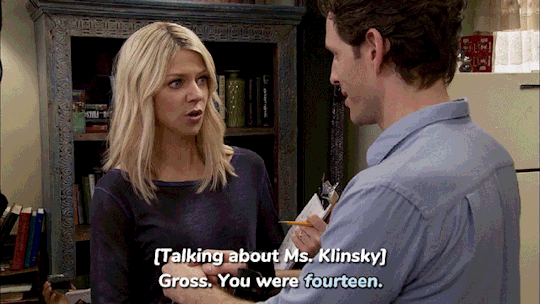
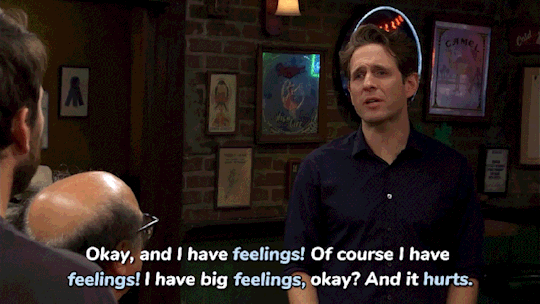
Dennis Reynolds | 6x01 // 11x04 // 12x08
#iasip#it’s always sunny in philadelphia#dennis reynolds#who up thinking about HIM !#can i be so real for a sec and say that dennis just makes me so so sad i could cry sometimes#like i would love for him to be happy#i just want him to be happy that’s literally all i’m asking#anyway#cw csa mention#still thinking about dtamhd actually#always sunny#he feels too much. btw if you even care#someone’s got to have made this before but i won’t be able to find it on this site so. we do what we must
46 notes
·
View notes
Text
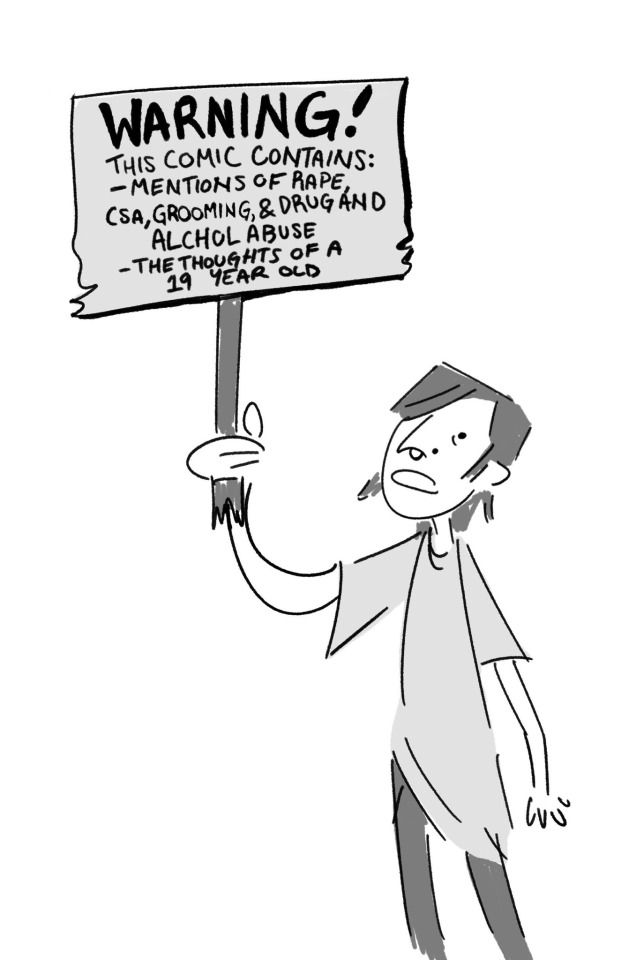
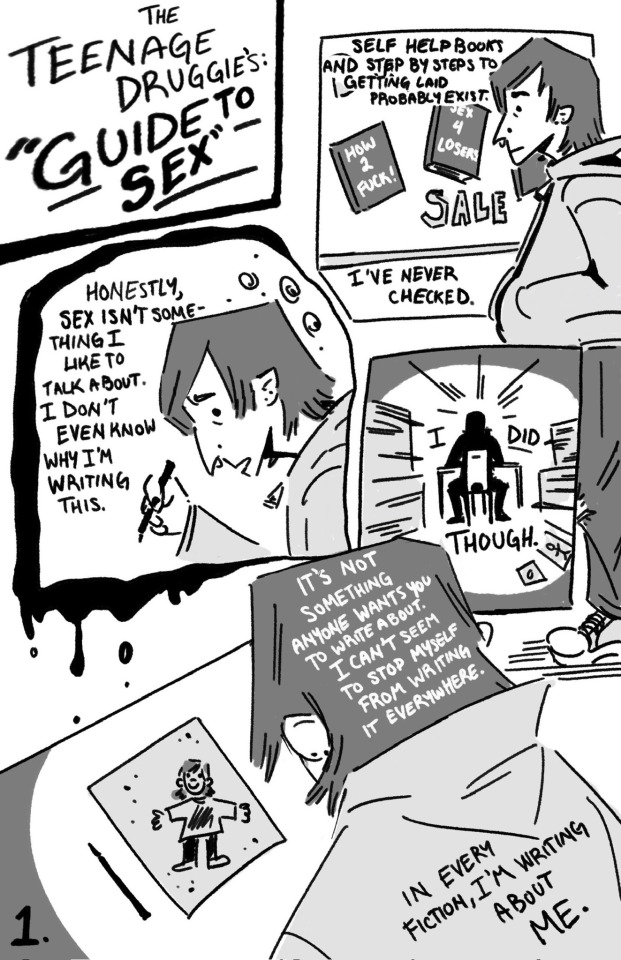
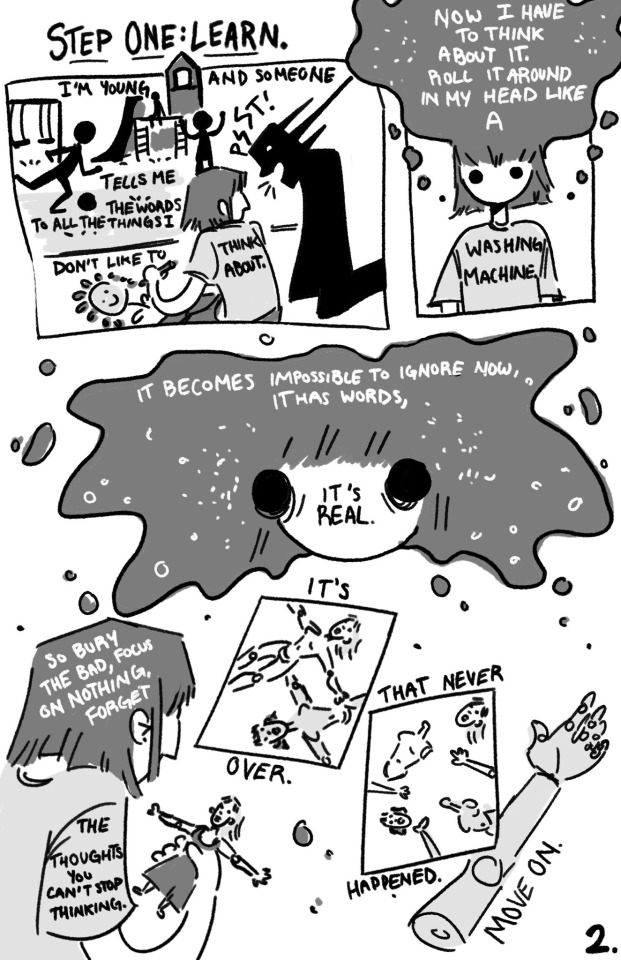
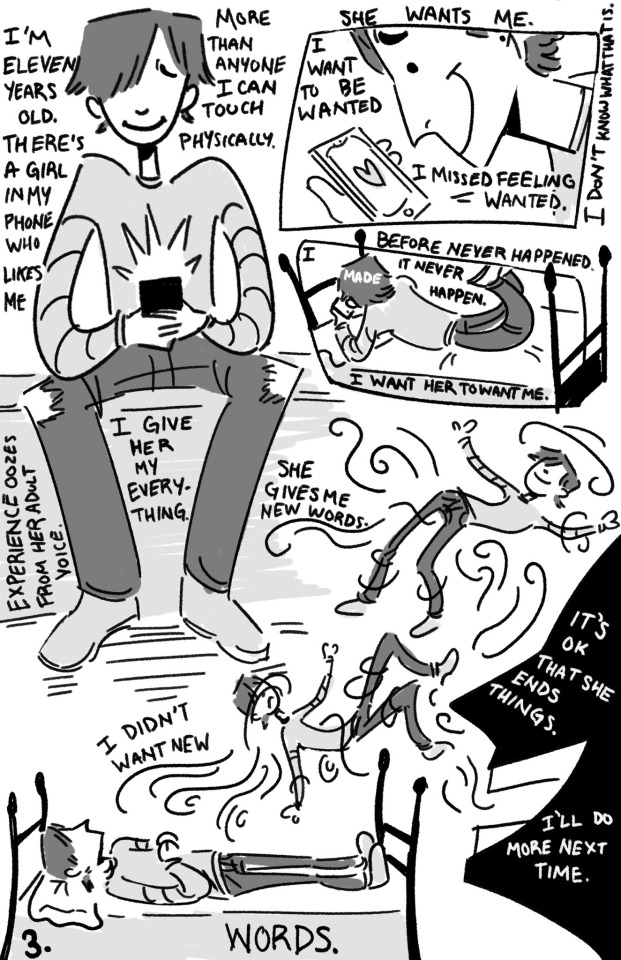
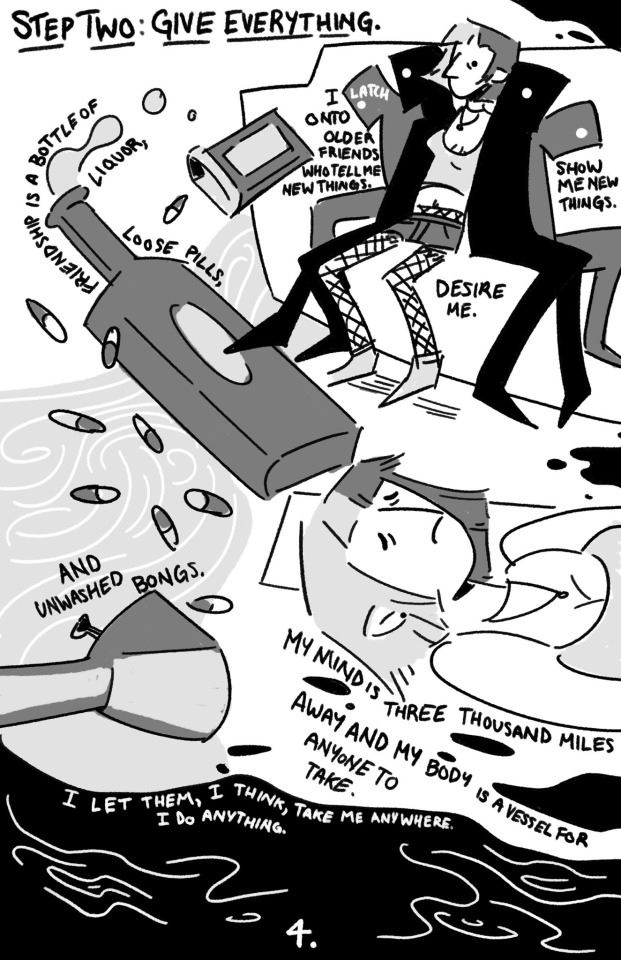
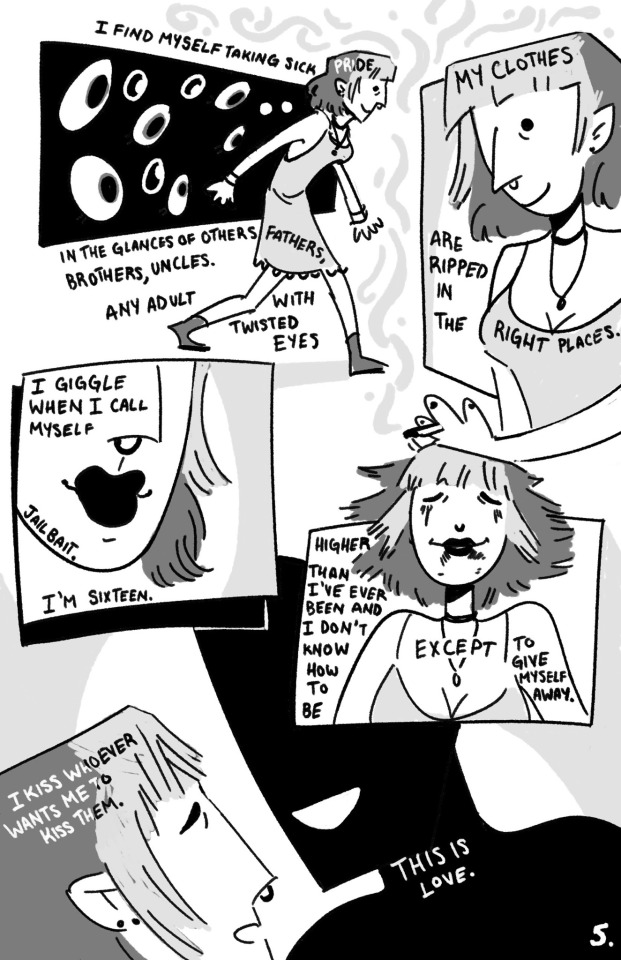
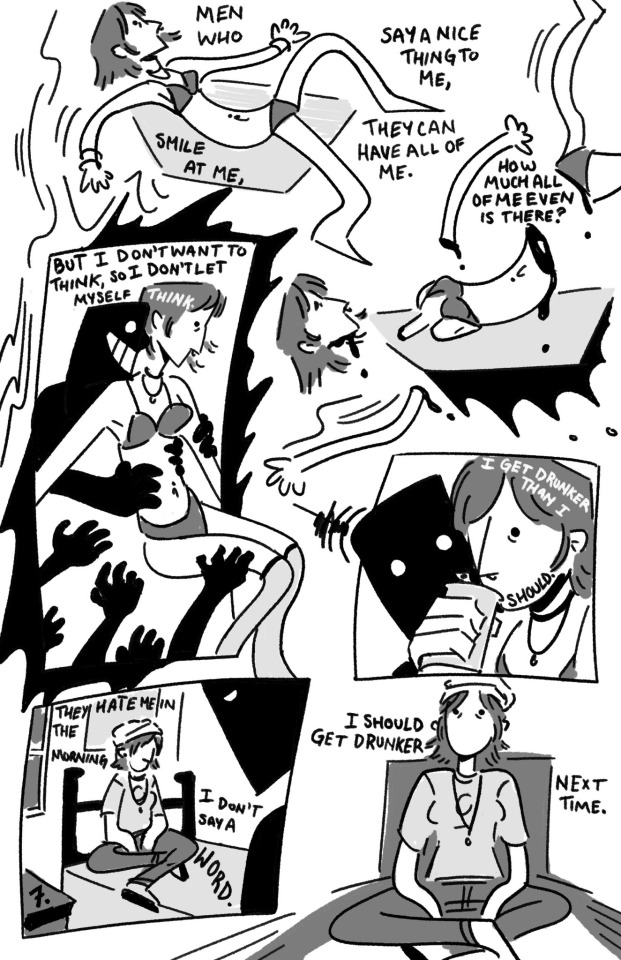
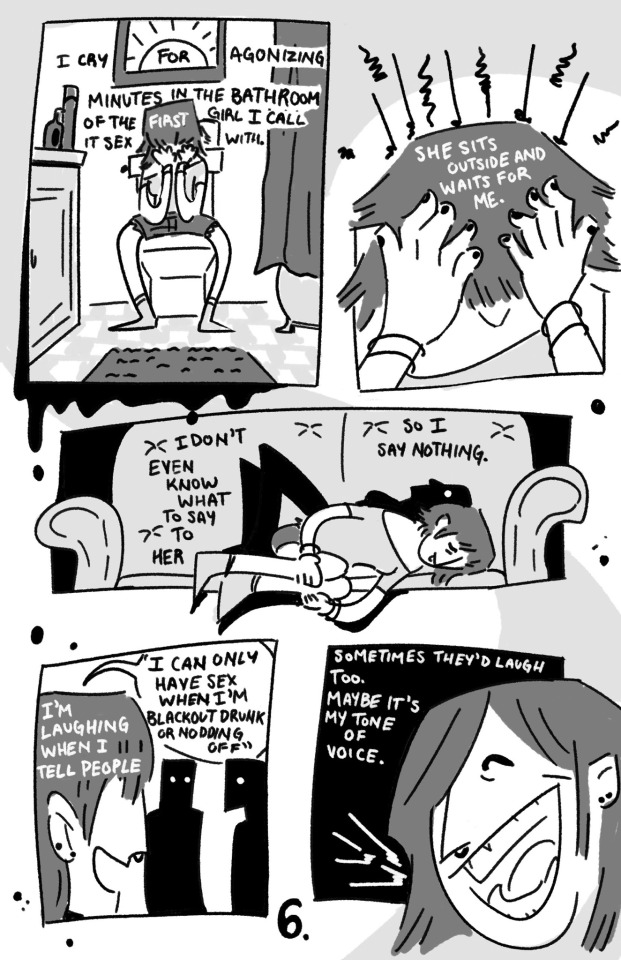
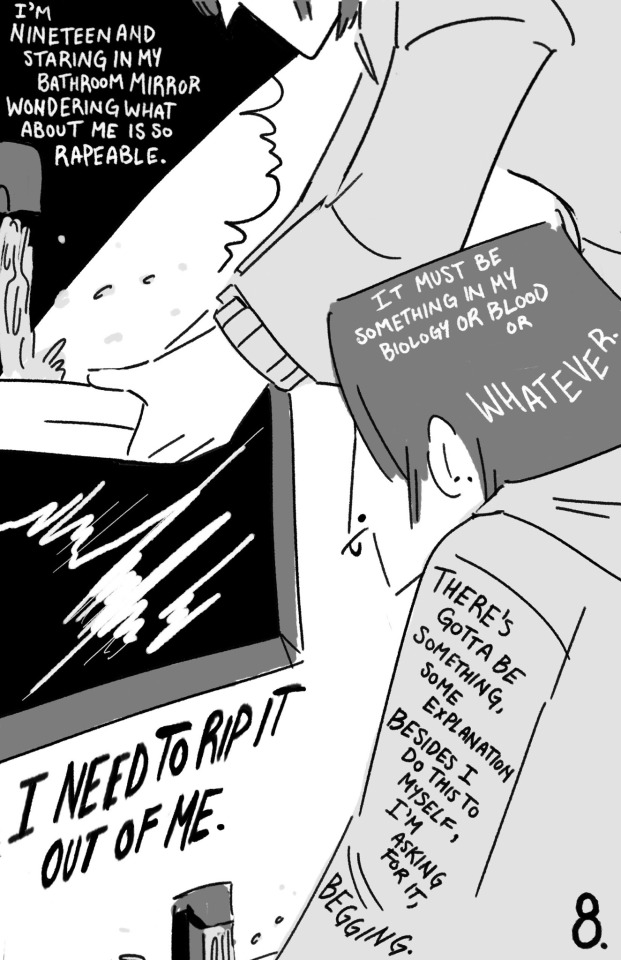
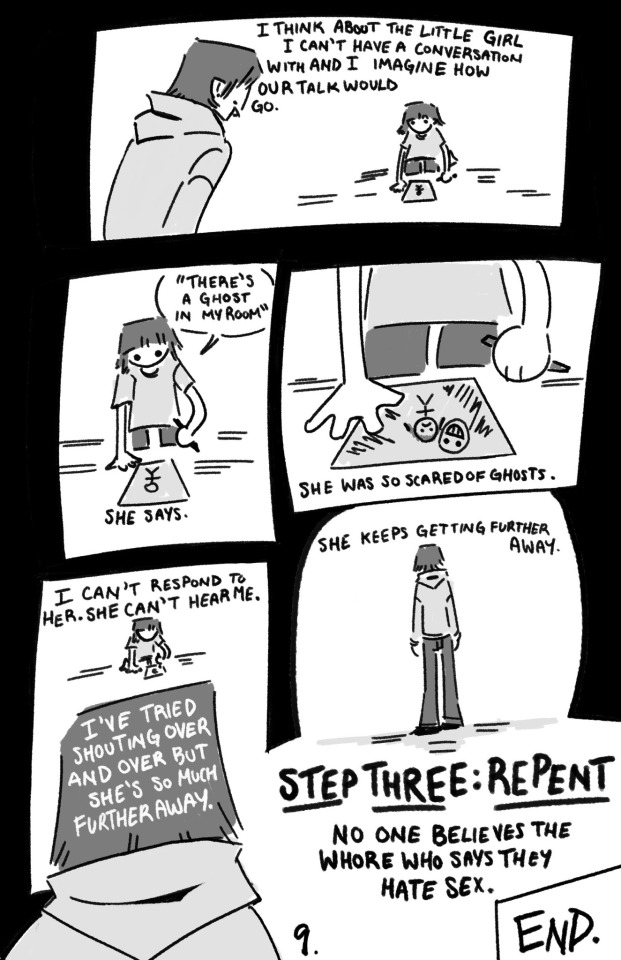
sometimes you just need to be a little vulnerable on the internet
here’s the first issue of a bio-comic zine i made. i dedicate my life to showing that the “perfect victim” doesn’t exist and growth can be a desperate struggle sometimes
if you relate to my story, i love you and i hope you find peace <3
#cw csa mention#cw sa mention#cw drugs#cw alcohol#cw abuse#comic artist#comic#webcomic#personal comic#bio comic#cartoonist#zine
11 notes
·
View notes
